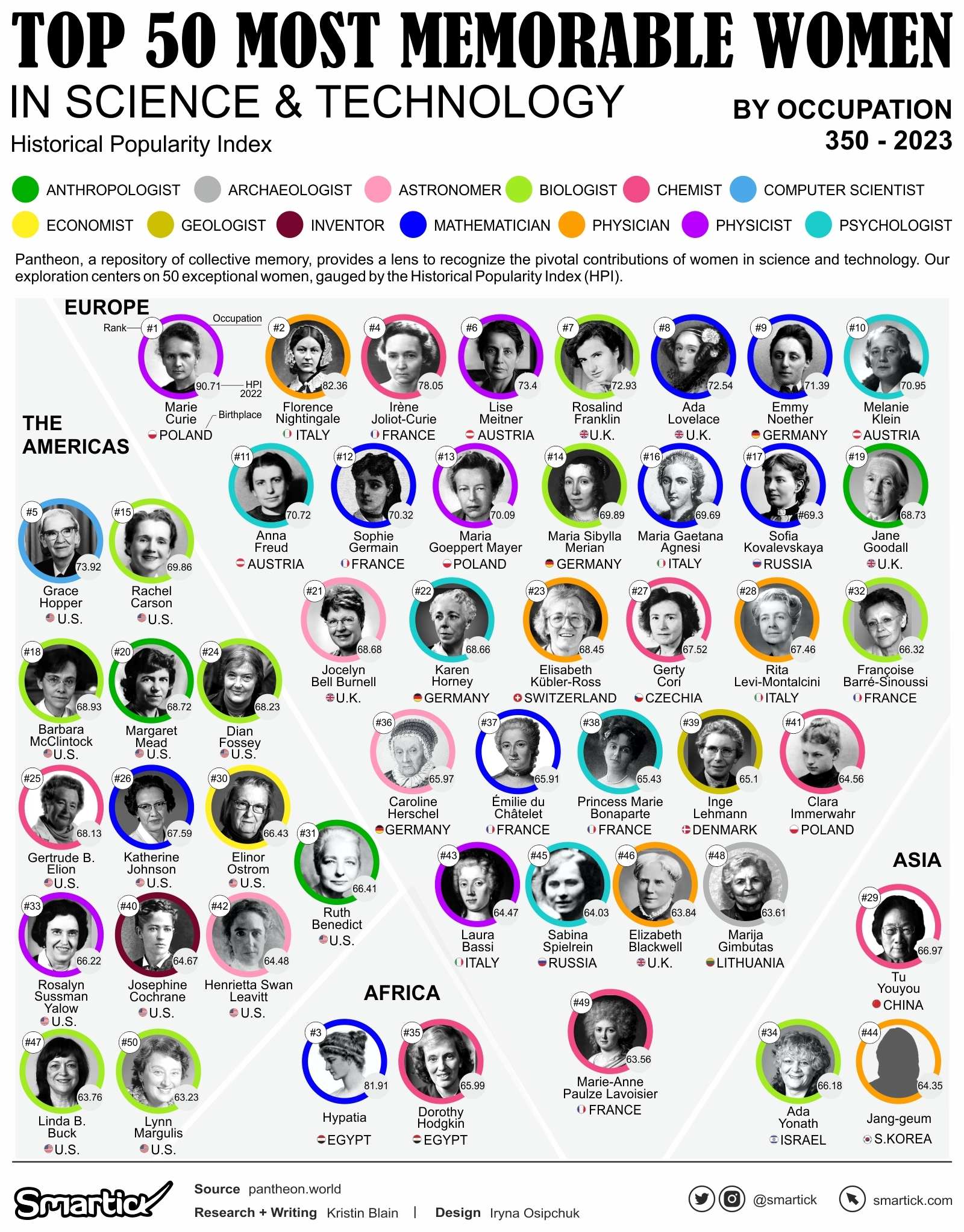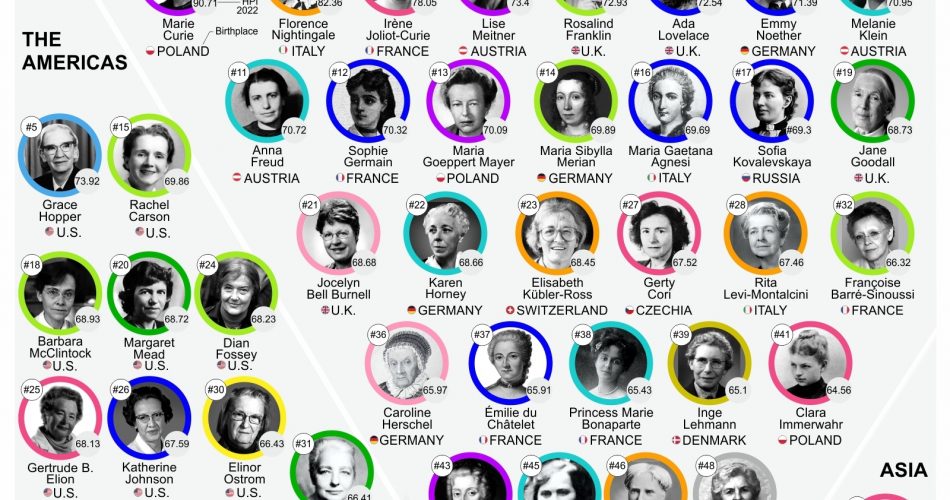
Pantheon, a repository of human collective memory, serves as our lens to recognize and appreciate the invaluable contributions of women in science and technology throughout history. In this exploration, we delve into the lives of 50 remarkable women, as measured by the Historical Popularity Index (HPI), shedding light on their accomplishments and the broader trends in their occupations and geographical origins.

Top 10 Most Memorable Women in Science & Technology
Discover the essence of brilliance as we unveil the Top 10 Most Memorable Women in Science & Technology. These exceptional individuals, determined by the Historical Popularity Index (HPI), represent a rich tapestry of achievements spanning various disciplines and time periods. From Marie Curie’s groundbreaking discoveries to Ada Lovelace’s visionary insights, each woman has left an indelible mark on the world of science and technology. Join us on a journey through their remarkable lives, applauding their enduring legacies that have shaped the course of history in these fields.
Marie Curie (1867-1934) – Physicist
Marie Curie, born in Warsaw, Poland, in 1867, remains an icon in the realms of physics and chemistry. Her groundbreaking work, including the discovery of the radioactive elements radium and polonium, earned her two Nobel Prizes. Despite societal norms restricting women in science during her time, Curie’s relentless pursuit of knowledge paved the way for future generations. Her enduring legacy is encapsulated in her remarkable Historical Popularity Index (HPI) ranking of 90.71, a testament to the global recognition of her contributions to science.
Florence Nightingale (1820-1910) – Physician
Florence Nightingale, originating from Florence, Italy, is revered as the founder of modern nursing. Born in 1820, Nightingale’s impact on healthcare reform transcended her era, leaving an indelible mark on the medical field. Her pioneering work during the Crimean War, emphasizing hygiene and sanitation, revolutionized nursing practices. Despite facing gender barriers, Nightingale’s legacy endures, reflected in her HPI ranking of 82.36. Her contributions continue to inspire nurses worldwide and underscore the critical role of women in shaping healthcare.
Hypatia (350-415) – Mathematician
Hypatia, a trailblazing mathematician born in Alexandria, Egypt, around 350 AD, defied societal expectations to become a leading scholar in a male-dominated field. Her contributions to mathematics and philosophy were monumental, influencing the intellectual landscape of her time. Despite facing challenges as a female scholar in ancient Alexandria, Hypatia’s work has endured through the ages, reflected in her HPI ranking of 81.91. Her legacy serves as a testament to the resilience and brilliance of women in STEM throughout history.
Irène Joliot-Curie (1897-1956) – Chemist
Irène Joliot-Curie, born in Paris, France, in 1897, continued the legacy of her renowned mother, Marie Curie, in the field of chemistry. Her achievements in nuclear physics and radioactivity, coupled with her collaboration with her mother, marked her as a pioneering figure. Joliot-Curie’s contributions, despite the challenges of her time, are evident in her HPI ranking of 78.05. Her work laid the foundation for advancements in nuclear science, showcasing the enduring impact of women in shaping scientific progress.
Grace Hopper (1906-1992) – Computer Scientist
Grace Hopper, born in New York City in 1906, stands as a trailblazer in the field of computer science. Her early work in programming languages and the development of COBOL played a pivotal role in the evolution of computing. Hopper’s impact on the technology landscape is immeasurable, reflected in her HPI ranking of 73.92. As a female pioneer in a male-dominated industry, she shattered barriers, leaving an enduring legacy that continues to inspire generations of women in technology.
Lise Meitner (1878-1968) – Physicist
Lise Meitner, with her roots in Vienna, Austria, made significant contributions to nuclear physics, particularly in the co-discovery of nuclear fission. Born in 1878, Meitner faced challenges as a woman in a field dominated by men. Despite this, her brilliance is evident in her HPI ranking of 73.40, showcasing the lasting impact of her work. Meitner’s legacy extends beyond her scientific achievements, serving as an inspiration for women aspiring to excel in STEM disciplines.
Rosalind Franklin (1920-1958) – Biologist
Rosalind Franklin, born in Notting Hill, United Kingdom, in 1920, left an indelible mark on molecular biology and genetics. Her work on the structure of DNA laid the foundation for groundbreaking discoveries. Despite facing challenges as a female scientist in the mid-20th century, Franklin’s contributions endure, as reflected in her HPI ranking of 72.93. Her dedication to scientific inquiry continues to inspire researchers in the biological sciences.
Ada Lovelace (1815-1852) – Mathematician
Ada Lovelace, born in London, United Kingdom, in 1815, is celebrated as the world’s first computer programmer. Her collaboration with Charles Babbage on the Analytical Engine laid the groundwork for modern computing. Lovelace’s visionary contributions, despite the societal norms of her time, are acknowledged in her HPI ranking of 72.54. As a pioneer in the field of computer science, Lovelace’s foresight has left an enduring legacy in the digital age.
Emmy Noether (1882-1935) – Mathematician
Emmy Noether, hailing from Erlangen, Germany, made profound contributions to abstract algebra and theoretical physics. Born in 1882, Noether faced challenges as a female mathematician, yet her work became foundational in multiple branches of mathematics. Her enduring impact is evident in her HPI ranking of 71.39, highlighting the recognition of her intellectual prowess. Noether’s legacy transcends gender barriers, serving as an inspiration for mathematicians and physicists worldwide.
Melanie Klein (1882-1960) – Psychologist
Melanie Klein, born in Vienna, Austria, in 1882, made significant contributions to the field of psychology. Her work in psychoanalysis, particularly in child development, has had a lasting impact. Despite facing challenges as a woman in a male-dominated field, Klein’s influence is reflected in her HPI ranking of 70.95. Her innovative theories continue to shape the understanding of human psychology and therapeutic practices.
Trends in Occupations Among the Top 50
Among the top 50 women in science and technology, a diverse array of occupations emerges. From physicists and mathematicians to biologists and computer scientists, these women have shaped various fields. This diversity reflects the expanding opportunities for women in STEM, breaking down traditional barriers and inspiring future generations.
The trends in these occupations over time mirror societal changes, reflecting the evolving landscape of gender equality in STEM. As women continue to break barriers, these role models pave the way for future generations, fostering innovation and progress in various scientific domains.
Country of Origin Analysis Among the Top 50
Geographical diversity is a hallmark among the top 50 women in science and technology. From Warsaw, Poland, to Alexandria, Egypt, and beyond, these women hail from different corners of the globe. Key countries, including the United Kingdom, France, and the United States, have produced a significant number of influential figures.
The global impact of these women underscores the importance of fostering diversity in STEM fields on a global scale. Cultural, educational, and societal factors have influenced the emergence of women in these regions, contributing to international collaboration and knowledge exchange.
In celebrating the lives of these remarkable women, we not only honor their individual achievements but also acknowledge the collective progress of women in science and technology. Their enduring legacies continue to inspire, paving the way for future generations to contribute to the ever-expanding tapestry of human knowledge. As we recognize the importance of ongoing celebration and exploration, let us continue to embrace the diversity and innovation that women bring to the forefront of scientific and technological advancements.

